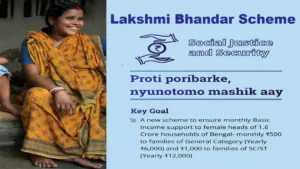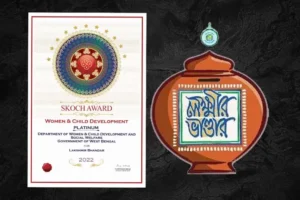The new study by Amartya Sen’s Pratichi Trust sheds light on the many sided impact of West Bengal’s Lakshmir Bhandar scheme.
There has been some debate surrounding its effectiveness. The study by Sen’s Pratichi Trust revealed the progress that this cash incentive has enabled for women. It delves into both its successes and the existing challenges that require focused attention. The scheme is one of the top initiatives of the state government and has significantly contributed to empowering women by enhancing their financial decision-making abilities and improving their standing within the family.
What is the cash incentive scheme of West Bengal?
Lakshmir Bhandar refers to the monthly income benefit scheme in the Indian state of West Bengal. It was announced by Chief Minister Mamata Banerjee in February 2021 during the West Bengal Assembly election campaign. This initiative has been designed to provide financial assistance to women from economically weaker sections of society. The scheme aims to empower women by offering monthly cash transfers directly to their accounts.

The key features of Lakshmir Bhandar, includes providing ₹1,000 every month to women from Scheduled Caste and Scheduled Tribe households and ₹500 per month for women from other categories. The primary goal has been to offer economic support to women and to contribute to their financial independence and decision-making capabilities.
The Lakshmir Bhandar scheme has also won a SKOCH award in women and child development category for improving the lives of lakhs of women.

Sen’s Pratichi Trust Study Results
The statistics reveal a noticeable shift in decision-making dynamics with 85.55% of women reporting that they get to independently determine how to allocate the financial assistance. This suggests a significant stride towards gender equality as women are getting to be key decision-makers in managing household finances.
There have also been reports of collaborative financial decision making showing that women are no longer taking a passive stance in money matters and are getting more actively involved. The collaborative decision-making, reported by 10.76% of respondents underscores a growing trend of shared financial responsibility within households.
Equally important is the finding that a majority of beneficiaries -61.07%, feel that their position within the family has been enhanced due to Lakshmir Bhandar. This suggests that the scheme not only addresses immediate financial needs of the women but also contributes to an overall improvement in the social standing of women within their families.
Challenges faced in improving conditions for women
However, Sen’s study serves as a reminder that despite the positive strides made, Lakshmir Bhandar is not a solution for all societal issues affecting women. Child marriage, a deeply rooted problem continues to persist, highlighting the need for a more comprehensive strategy beyond direct cash transfers. The researchers advocate for a deeper understanding of the qualitative potential of the scheme emphasizing that its impact goes beyond the quantifiable amount distributed.
It is important to note that policy making alone cannot change the status of women in our society and that a deeper understanding of the issues faced by women should be analyzed. Despite efforts made to increase girl child education by offering incentives, the number of girls who stay in schools beyond primary education in lower socio-economic communities is still low.
Sen’s study recommends policy-level conversations and increasing awareness surrounding the complex relationship between economic empowerment and societal challenges like domestic violence and child marriage. Furthermore, it underscores the importance of adapting interventions to address the specific needs of different socio-economic groups particularly advocating for just treatment of women from marginalized backgrounds, such as those belonging to the OBC category and Muslim communities.
While Lakshmir Bhandar has emerged as a positive force in enhancing women’s empowerment, the study has also highlighted the need for a holistic approach to address deeply rooted societal issues and to ensure that policy initiatives are constantly evolving to meet the dynamic challenges faced by women in the region. Policymakers need to consider these findings to refine and expand the impact of such initiatives for a more inclusive and sustainable transformation in the lives of women.











Comments 2